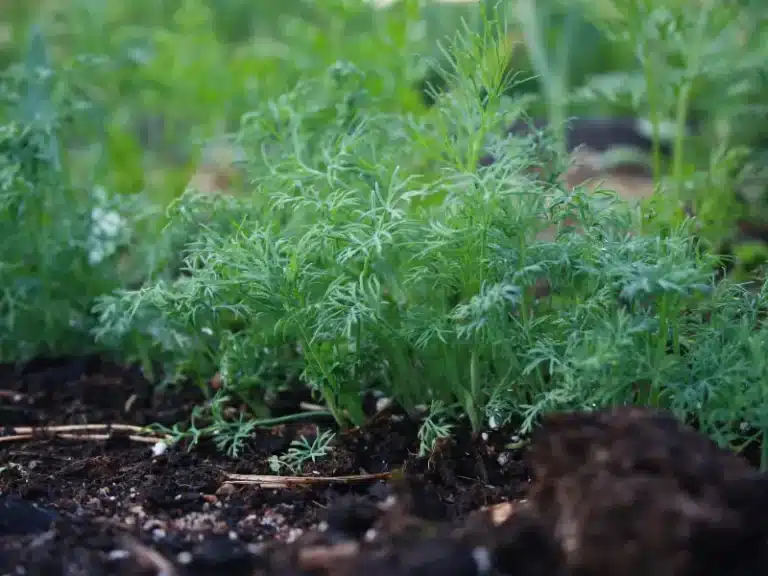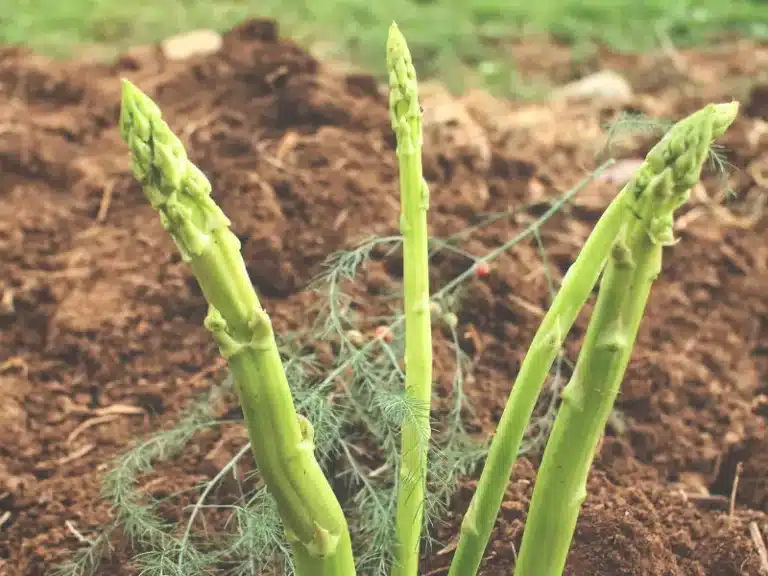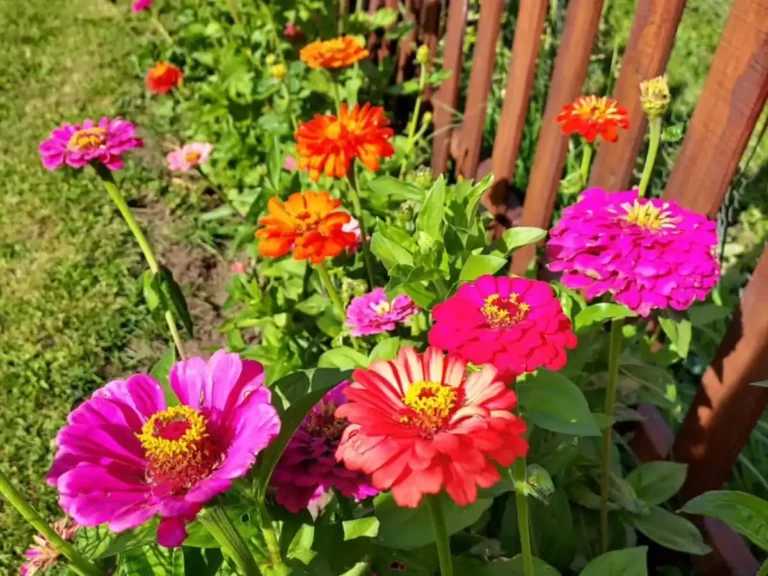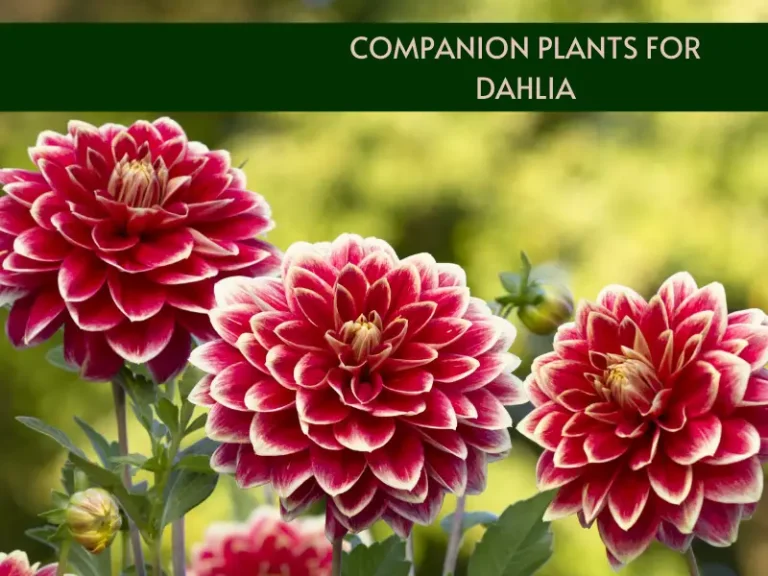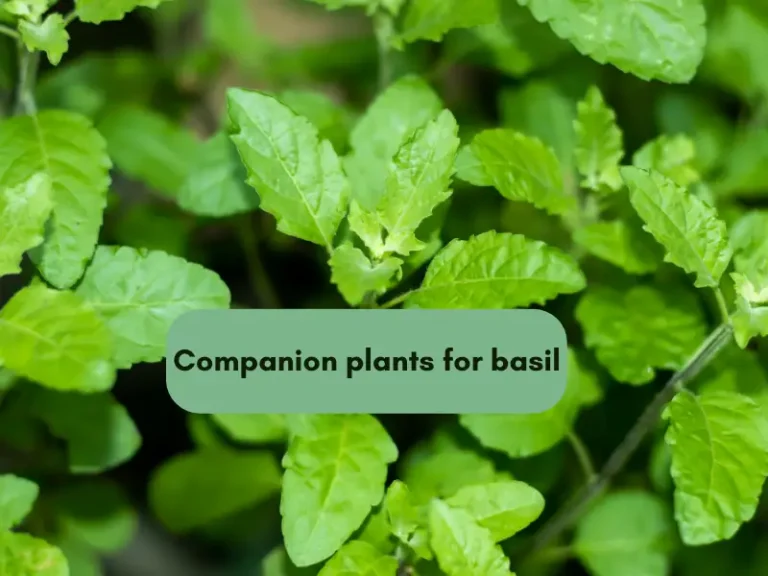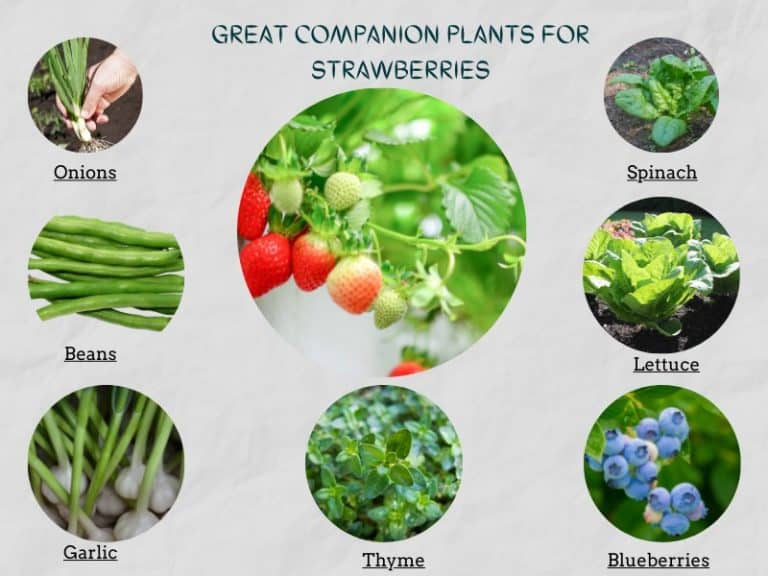9 Best Raspberry Companion Plants
When growing raspberries in your home garden, one of the ways to ensure you harvest more fruit is by pairing the raspberries with the right companion plants.
Being a seasoned master gardener, I often advise beginner gardeners to choose plants with similar care requirements and growth conditions as raspberries for a successful garden. Benefits of pairing include attracting pollinators, enriching the soil, and repelling pests.
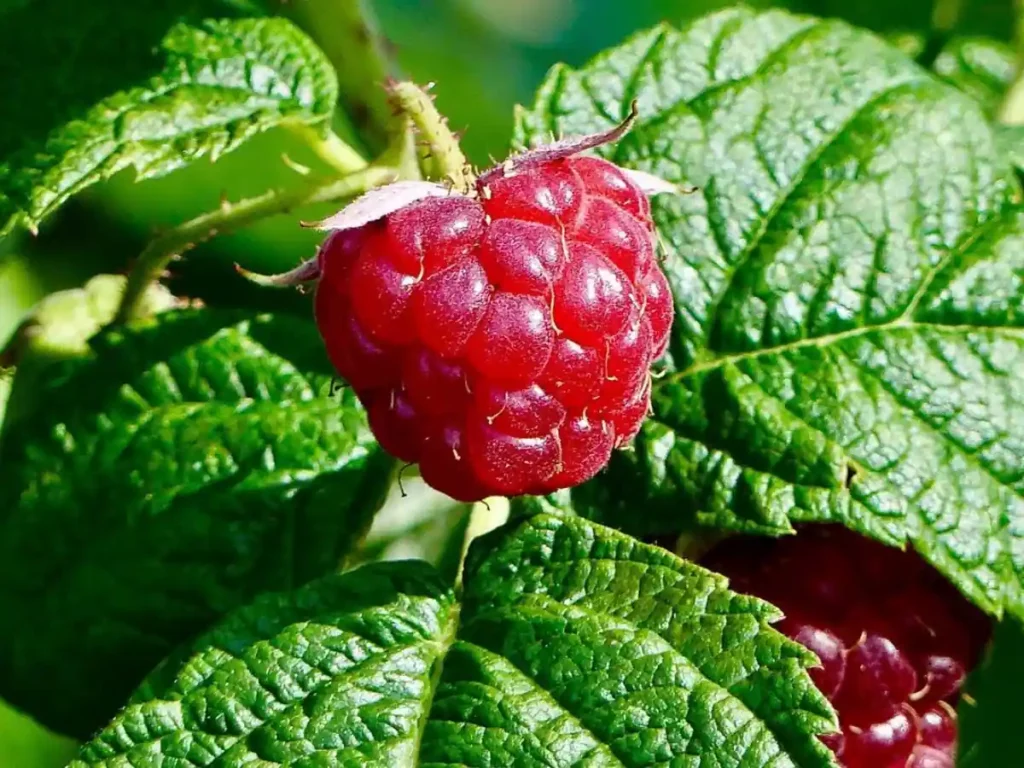
Companion to Pair with Raspberry Bushes
The best companion plants for raspberries enrich the soil, deter raspberry pests, and attract pollinator insects and birds.
It is recommended to pair raspberries with the following garden plants: alliums, turnips, marigolds, pine trees, chervil, Artemisia, clover, yarrow, and aromatic herbs (thyme and chamomile).
Alliums
Leeks, shallots, onions, and other alliums are great companion plants for raspberries as they repel pests.
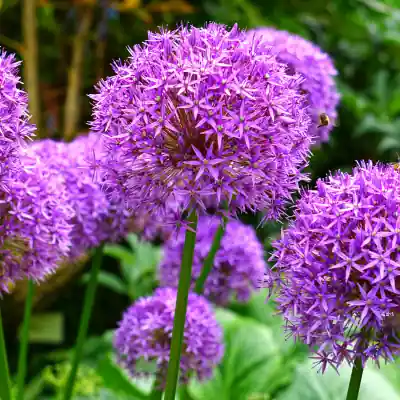
By inter-planting raspberries with alliums, we’re able to deter common raspberry pests like spotted-wing drosophila, Japanese beetles, and leafhoppers.
In fact, alliums deter insect pests and larger critters such as rabbits and deer fond of nibbling on raspberry fruits and tender shoots.
Raspberries are also susceptible to verticillium wilt, which is a fungal disease. Verticillium wilt causes stunted growth, wilting, and reduced yields in raspberries.
The strong scent of alliums repels the fungus that causes verticillium wilt, making alliums a great plant pair for raspberries.
Turnips
Turnips and raspberries form an excellent plant pair since they have similar care requirements.
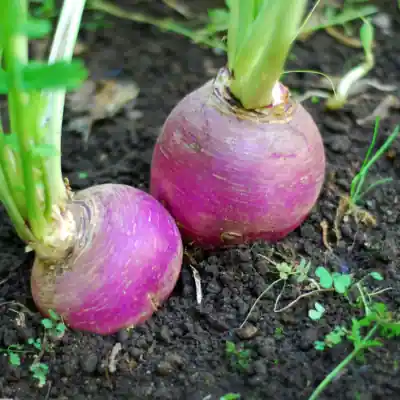
Both plants thrive in full sun and moist soil conditions. Moreover, the best time of the year to plant raspberries and turnips is spring.
Both turnips and raspberries require 1-1.5 inches of water per week to thrive.
Turnips are also an excellent deterrent to Harlequin bugs, which attack raspberries from time to time.
Marigolds
Raspberries also coexist well with marigolds in a polyculture system. The best time of the year to plant raspberries is after the last frost when the soil starts to warm up. The same goes for marigolds; thus, you can plant marigolds and raspberries simultaneously.
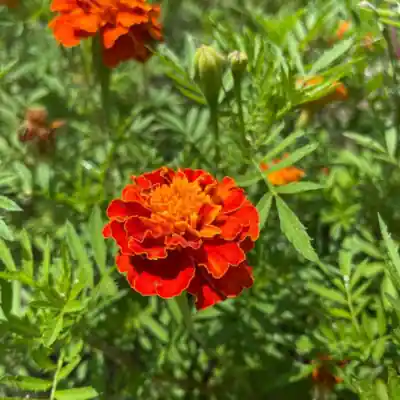
Raspberries are susceptible to nematodes, so we often plant marigolds nearby to repel these pests.
Nematodes are tiny, soil-borne worms that feed on plant roots, resulting in poor plant health. If you want to keep nematodes off for improved health and yield, pair your raspberry plants with marigolds.
Marigold blooms are vibrant red, gold, and orange flowers that do so well to attract pollinators, especially bees. Whenever I have plenty of bees in my garden, my raspberry harvest is bountiful.
I highly recommend planting marigolds as companion plants for raspberries, especially for those growing these fruits for commercial purposes.
Pine trees
Not your obvious pairing, but raspberries and pine trees make a great pairing that benefits the soil.
Pine increases the acidity (lowers the pH) of soil, while raspberries thrive in acidic-slightly acidic soils with pH levels ranging from 5.5-6.5. Therefore, if your garden soil is neutral-alkaline (pH of 7.0 or higher), you can pair the raspberries with pine to make the soil more acidic and suitable for the growth of the raspberries.
Note: Pine tree needles, when used for mulching, also enrich the soil, resulting in improved growth of the raspberry bushes and higher yields.
Pine trees grow taller than raspberry bushes, which is why I recommend planting them along the border of the garden and spacing them well so that the raspberry bushes can still receive a decent amount of sunlight.
Raspberries will still thrive in partial shade but won’t do as well in full-shade conditions.
Chervil
Chervil is an annual herb that offers multiple benefits when paired with raspberries. Bees are usually attracted to this common herb, and raspberries need bees for pollination to produce larger fruit yields.
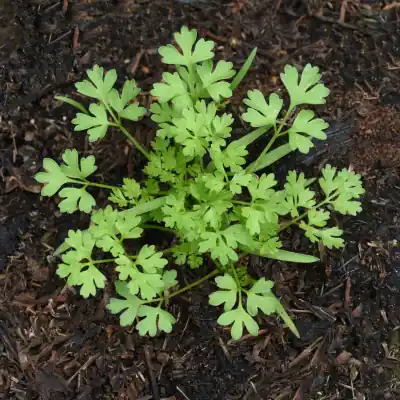
Chervil also deters various raspberry pests, including squash bugs and Japanese beetles. Squash bugs feed on raspberry leaves and fruits, resulting in lower fruit yields or unmarketable fruits.
Meanwhile, Japanese beetles like to feed on raspberry leaves, leaving them weak and curled, with a reduced ability to photosynthesize.
In return, the taller raspberry bushes provide chervil with partial shade during the season’s hottest days. Chervil doesn’t do well under full sunlight and will develop fewer leaves in such conditions.
Artemisia
Raspberry, by itself, already attracts bees due to its colorful pink-purple blooms. However, with bees responsible for 95% of pollination in raspberries, you can never have enough bees.
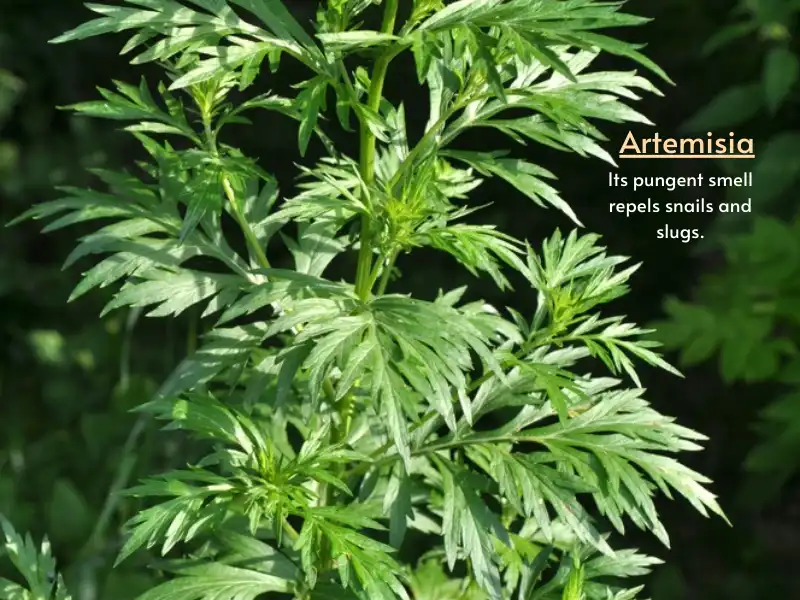
Pairing raspberries with Artemisia helps to attract even more bees for an even higher fruit yield.
Artemisia is also an excellent ground cover plant. It suppresses raspberry weeds by blocking sunlight access. I plant it quite a lot because it minimizes soil erosion and improves water retention capacity of my soil.
Note: Artemisia also repels deer, rabbits, and insects that damage raspberry canes and fruits.
Clover
Raspberries thrive in rich soil that’s full of nutrients. One way to enrich the earth is by planting nitrogen-fixing plants such as white and crimson. With more nitrogen nutrients in the soil, raspberry canes grow taller and produce more fruit.
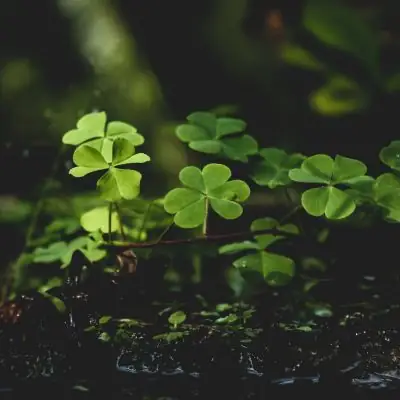
Clover also does well as living mulch, shading out any weeds that might crop up to slow down the growth of the raspberry bushes. It’s also a ground cover crop that prevents soil erosion and helps with water retention.
During the hottest summer days, raspberries need to retain as much water as possible within the root zone, and ground cover plants like clover can help with this.
Note: If you’ve inter-planted raspberry with white clover, always remember to mow the flowers before they turn into seeds. By doing this, you’ll be able to prevent the clover from taking over your garden through excessive seed production and dispersal.
Yarrow
Yarrow is a good option if you want to pair raspberry with another plant purely for aesthetic purposes. The combination of pink-purple raspberry blooms and white, red, orange, or yellow yarrow flowers makes for a visual spectacle.
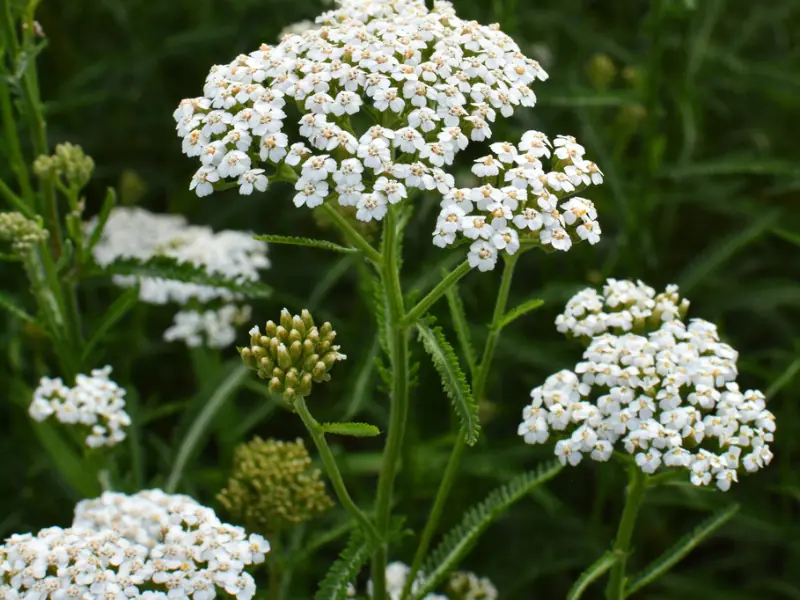
The vibrant yarrow blossoms also attract pollinators like bees, beetles, and butterflies. Raspberry blooms only attract bees.
As such, raspberries and the other plants in the garden could use the extra pollinator insects for optimal pollination and higher fruit yields.
Check out some more companions for Yarrow.
Aromatic herbs (Thyme and chamomile)
You can also pair raspberries with aromatic herbs like thyme and chamomile. Thyme produces a chemical called anthocyanin that boosts the flavor of raspberry fruits. The aromatic scents of thyme also repel many insect pests, some of which invade raspberry bushes.
Meanwhile, chamomile’s scent repels various fungal and bacterial infections that typically infest raspberries.
Chamomile is also a good form of natural mulch since raspberries thrive in rich soil full of nutrients. Cut down the chamomiles at the end of the season and leave them in the garden to form to enrich the soil and boost the growth of your raspberry bushes.
Plants NOT to Pair with Raspberries
Certain plants shouldn’t be paired with raspberries. Some of these plants can lower the vigor of raspberries, while others can attract fungal diseases and spread them to raspberries. For higher fruit yields and better plant health, avoid pairing raspberries with the following plants: fennel, tomatoes, eggplants, potatoes, peppers, strawberries, and blackberries.
Fennel
Fennel is an allelopathic plant, meaning that its roots release particular biochemicals that inhibit the growth and development of the roots of any other plants growing close by.
If you inter-plant raspberries with fennel, the raspberries will suffer from stunted growth and produce meager fruit yields.
Tomatoes
Tomatoes are prone to fungal infestations such as blight and verticillium wilt, which will spread over to raspberries too if these two crops are inter-planted as companion plants.
For the same reason, other garden plants prone to fungal infestations should not be paired with raspberries. These include eggplants, potatoes, and peppers.
Other types of berries
It’s not advisable to plant raspberries close to other berry plants like strawberries and raspberries, as they compete for resources, resulting in reduced yields for both plants. Fungal diseases can also spread quickly from one type of berry plant to another.
Final thoughts
When pairing companion plants with raspberries, I recommend considering the growth habits, care needs, and pest vulnerabilities of both plants.
Choose companion plants that enrich the soil, attract pollinators, and help control pests while not competing excessively for sunlight, nutrients, and water.
FAQs about companion planting raspberries
Read on for some answers to common questions about pairing raspberries with other plants.
It’s best not to plant strawberries and raspberries together, as they have very similar growth habits and pest vulnerabilities. Planting them together often leads to excessive competition for nutrients, sunlight, and water. However, should you plant them together in the same row, which you can, space them generously and feed the plants adequately for a good yield.
Yes, raspberries can be grown near mature fruit trees like apples, pears, cherries, and plums because they can tolerate partial shade. Just be sure to give the raspberry canes sufficient space from the tree trunks to prevent overcrowding. Pruning fruit trees will help reduce excess shade that may affect your raspberries.
Planting blackberries and raspberries together often results in the spread of diseases from one plant to the other. Viruses like the mosaic virus can spread from red raspberries and is more severe on black and purple raspberries. It can quickly spread between blackberries and raspberries when planted in close proximity. Keeping them apart reduces disease transmission.
It’s best not to plant raspberries and blueberries next to each other because blueberries need acidic soil with a pH between 4.8-5.5 to thrive, while raspberries prefer mildly acidic soil around pH 6.0. When planted in the same bed, the soil only suits one plant’s needs.
READ MORE:
- Recommended companion plants for pepper
- What to plant together with asparagus
- Plants you can pair with leeks


